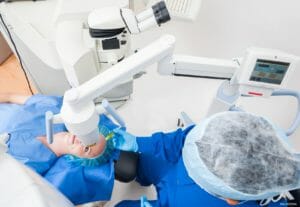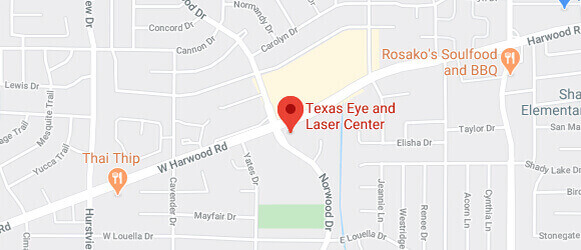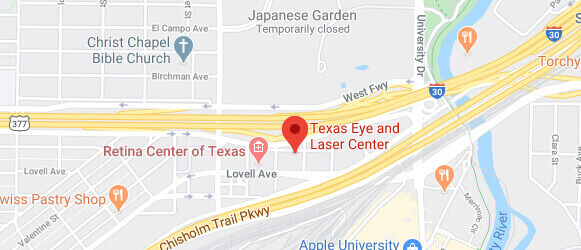Corneal collagen crosslinking is an exciting and innovative treatment option for keratoconus (a condition characterized by bulging of the cornea) that is available now at Texas Eye and Laser Center. Clinical trials have found that corneal crosslinking can successfully stop the progression of keratoconus and, in some cases, even eliminate the need for a corneal transplant, a more invasive treatment option.
Continue reading to learn more about corneal cross-linking.

Corneal Collagen Crosslinking Procedure
How Does Corneal Crosslinking Work?
Corneal crosslinking is a quick and painless in-office procedure that involves administering riboflavin (vitamin B2) drops into the eye which is then activated via a UV light. This increases the number of “crosslinks” in the eye, which strengthens the cornea and allows it to hold its shape. A smoother, round-shaped cornea is essential for clear vision.
How Effective Is Corneal Crosslinking?
Corneal crosslinking is highly effective in treating mild or early cases of keratoconus. But it is important to understand that while the treatment can halt the progression of the disease, it cannot cure it. Studies show that the effects of corneal cross-linking can last for many years.
Am I a Candidate for Corneal Crosslinking?
Ideal candidates for corneal crosslinking are individuals with mild or early keratoconus. In addition, patients should also have a sufficient amount of corneal thickness in order for the procedure to be performed. Your eye doctor can determine whether corneal cross-linking is right for you following an evaluation of your medical history, eye health, and symptoms.
Are There Other Options for Treating Keratoconus?
If you are not eligible for corneal crosslinking, there are other treatment options available. Texas Eye and Laser Center offer Intacs, which are small biocompatible implants placed on the cornea. These inserts work to flatten the bulging cornea, allowing the eye to better focus light and see properly. Some patients benefit from combining Intacs with corneal crosslinking. Patients with severe cases of keratoconus may need a cornea transplant, which involves attaching donor corneal tissue to the eye to prevent the cornea from bulging.
To learn more about corneal crosslinking or other treatment options for keratoconus, please schedule an appointment with Texas Eye and Laser Center by calling (817) 540-6060.



